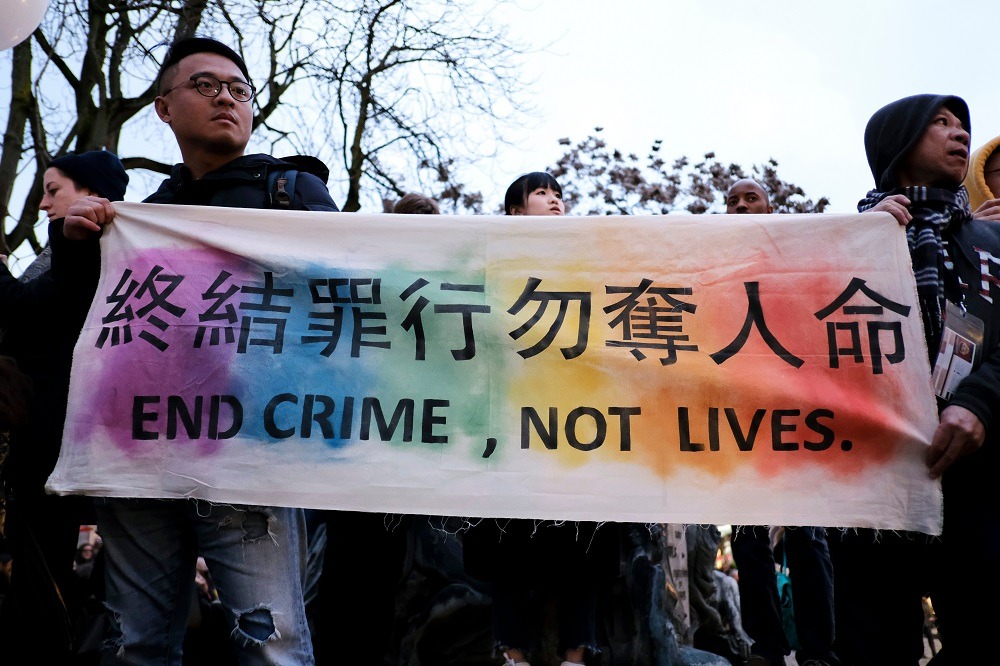Ex-convicts, activists call for end to capital punishment

Activists hold a banner protesting against executions and calling for the abolition of death penalty around the globe during a rally in Brussels, Belgium, on March 1, 2019. (Alexandros Michailidis /Shutterstock.com)
Marguerite Afra Sapiie
The Jakarta Post
Brussels, Belgium / Wed, March 6 2019
Antoinette Chahine, a former death row prisoner from Lebanon, remembers with dread being wrongly accused and later sentenced to death for a crime she says she never committed.
Chahine was first arrested in March 1994 in connection with the assassination of a priest, for which the Lebanese Forces, a Christian militia banned by the government, was believed to be responsible.
Authorities accused her of being a member of the group.
“I was a student. I was arrested because my brother was a member of the Lebanese Forces, but he had left Lebanon at the time. Maybe it was easier for [the authorities] to get me instead,” she said recently.
When she was detained, Chahine was reportedly tortured in a number of different ways, including being beaten and scalded with hot water. At certain points, she was brought to a hospital for her bruises and injuries.
She denied the charges against her and asserted her innocence in court, but the judges handed down the death penalty in January 1997.
“I cried. I lost consciousness,” she said, remembering how she had already packed before the last trial hearing because she was so sure she would go free.
Following reports from Amnesty International about her “flawed” trial, which put pressure on the Lebanese authorities, she was released in 1999.
Chahine is now one of many former death row convicts who actively call for the abolition of the death penalty, arguing that capital punishment negates fundamental human rights and is dangerous at a time when judicial systems are still prone to error.
She shared her experiences as part of an abolition campaign event during a session of the seventh World Congress against the Death Penalty held recently in Brussels, organized by France-based human rights group Together against the Death Penalty (ECPM).
The congress, held once every three years, brings together thousands of activists, members of state human rights bodies and representatives of governments from around the world in an effort to step up efforts for the universal abolition of the death penalty.
Sabine Atlaoui, the wife of Serge Atlaoui — a French drug convict currently incarcerated in Indonesia, also spoke about her years of struggle in advocating for her husband’s release, while at the same time taking care of their four children who still have no clue their father is on death row.
“I say to my children that [my husband] is out for work,” Atlaoui said. “We are still fighting so that daddy can come home. We are trying to protect our children.”
Serge Atlaoui was arrested in 2005 when the police raided a secret drug factory in Tangerang, Banten. He was accused of being a “chemist” at the site, an accusation which Atlaoui has repeatedly denied. He insists he was installing industrial machinery in what he thought was an acrylics factory.
President Joko “Jokowi” Widodo rejected Atlaoui’s appeal for clemency in late 2014, prompting him to lodge a case review at the Supreme Court, but which the court also rejected in 2015.
Paris has since mounted a campaign to save the Frenchman.
“We don’t know when the execution will come, [it might be] years, days, [before he is] pardoned […] but I will not quit,” she said. “The situation can deprive [him of] his liberty, but not our love.”
As of 2018, at least 146 countries and territories had abolished the death penalty either by law or in practice. Indonesia, however, is among 52 retentionist states that still retain the practice for drug offenses and murders.
But all is not lost.
Hsu Tzu-Chiang, a former death row inmate from Taiwan, recounted his personal two-decade journey from death row to freedom.
In 1995, Hsu was sentenced to death for the kidnap and murder of a businessman, a crime that he said he had neither committed nor had any involvement with in the first place.
“I actually surrendered myself to the police to explain [my innocence and] walked out of the detention center 16 years later,” Hsu said.
He expressed disappointment with Taiwan’s justice system, which handed him a total of seven death sentences and two life sentences over many trials.
He left prison in 2012 after the enactment of the Speedy Trials Act, which stipulates that a defendant awaiting a final verdict cannot be detained for more than eight years.
In 2016, the Supreme Court annulled Hsu’s death sentence and acquitted him of all charges. Since then, Hsu has worked with NGOs like those that helped to campaign for his release, and continues to share his story as part of efforts to raise awareness about the abolition of capital punishment.
“The end of the death penalty still has a long way to go, but we can do little by little with our own efforts [to call for its abolition],” Hsu said. “The death penalty must not exist in the world.”
This article was originally published in The Jakarta Post's print edition on May 28, 2019, with the title "Ex-convicts, activists call for end to capital punishment".
